formerly eScholarship Editions


|
|
|
|
Your request for similar items found 20 book(s). | Modify Search | Displaying 1 - 20 of 20 book(s) | |
| 1. |  | Title: Silence at Boalt Hall: the dismantling of affirmative action Author: Guerrero, Andrea 1970- Published: University of California Press, 2002 Subjects: American Studies | Anthropology | Sociology | African American Studies | Asian American Studies | Politics | Gender Studies | Law | Politics | Politics Publisher's Description: In 1995, in a marked reversal of progress in the march toward racial equity, the Board of Regents voted to end affirmative action at the University of California. One year later the electorate voted to do the same across the state of California. Silence at Boalt Hall is the thirty-year story of students, faculty, and administrators struggling with the politics of race in higher education at U.C. Berkeley's prestigious law school - one of the first institutions to implement affirmative action policies and one of the first to be forced to remove them. Andrea Guerrero is a member of the last class of students admitted to Boalt Hall under the affirmative action policies. Her informed and passionate journalistic account provides an insider's view into one of the most pivotal and controversial issues of our time: racial diversity in higher education. Guerrero relates the stories of those who benefited from affirmative action and those who suffered from its removal. She shows how the "race-blind" admission policies at Boalt have been far from race-neutral and how the voices of underrepresented minority students have largely disappeared. A hushed silence - the silence of students, faculty, and administrators unwilling and unable to discuss the difficult issues of race - now hangs over Boalt and many institutions like it, Guerrero claims. As the legal and sociopolitical battles over affirmative action continue on a number of consequential fronts, this book provides a rich and engrossing perspective on many facets of this crucial question. [brief] Similar Items |
| 2. | 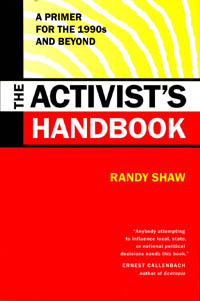 | Title: The activist's handbook: a primer for the 1990s and beyond Author: Shaw, Randy 1956- Published: University of California Press, 1996 Subjects: Politics | Sociology | California and the West | Urban Studies | American Studies | Public Policy Publisher's Description: The Activist's Handbook is a hard-hitting guide to winning social change in the 1990s. Randy Shaw, attorney and longtime activist for urban issues, shows how positive change can still be accomplished despite an increasingly grim political order, if activists employ the strategies set forth in this desperately needed primer.Inspiring "fear and loathing" in politicians, building diverse coalitions, and harnessing the media, the courts, and the electoral process to one's cause are only some of the key tactics Shaw advocates and explains. Central to all social-change activism, Shaw shows, is being proactive: rather than simply reacting to right-wing proposals, activists must develop an agenda and focus their resources on achieving it. The Activist's Handbook details the impact of specific strategies on campaigns across the country: battles over homelessness, the environment, AIDS policies, neighborhood preservation, and school reform among others. Though activist groups can have widely different aims, similar tactics are shown to produce success.Further, the book offers a sophisticated analysis of the American power structure by someone on the front lines. In showing how people can and must make a difference at both local and national levels, this is an indispensable guide not only for activists, but for everyone interested in the future of progressive politics in America. [brief] Similar Items |
| 3. | 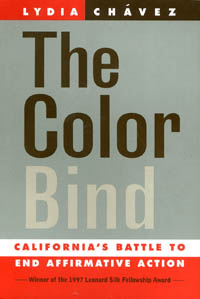 | Title: The color bind: California's battle to end affirmative action Author: Chavez, Lydia 1951- Published: University of California Press, 1998 Subjects: Politics | American Studies | Public Policy | California and the West Publisher's Description: The Color Bind tells the story of how Glynn Custred and Thomas Wood, two unknown academics, decided to write Proposition 209 in 1992 and thereby set in motion a series of events, far beyond their control, destined to transform the legal, political, and everyday meaning of civil rights for the next generation. Going behind the mass media coverage of the initiative, Lydia Chávez narrates the complex underlying motivations and maneuvering of the people, organizations, and political parties involved in the campaign to end affirmative action in California.For the first time, the role of University of California regent Ward Connerly in the campaign - one largely assigned to public relations - is put into perspective. In the course of the book Chávez also provides a rare behind-the-scenes journalistic account of the complex and fascinating workings of the initiative process. Chávez recreates the post-election climate of 1994, when the California Civil Rights Initiative (CCRI) appeared to be the right-time, right-place vehicle for Governor Pete Wilson and other Republican presidential prospects. President Clinton and the state Democratic Party thought the CCRI would splinter the party and jeopardize the upcoming presidential election. The Republicans, who saw the CCRI as a "wedge issue" to use against the Democrats, found to their surprise that the initiative was much more divisive in their own party.Updating her text to include the most current material, Chávez deftly delineates the interplay of competing interests around the CCRI, and explains why the opposition was unsuccessful in its strategy to fight the initiative. Her analysis probes the momentous - and national - implications of this state initiative in shaping the future of affirmative action in this country. [brief] Similar Items |
| 4. | 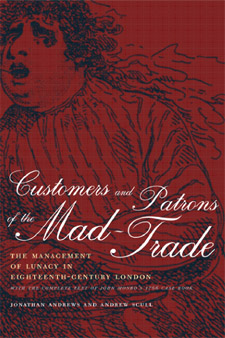 | Title: Customers and patrons of the mad-trade: the management of lunacy in eighteenth-century London: with the complete text of John Monro's 1766 case book Author: Andrews, Jonathan 1961- Published: University of California Press, 2003 Subjects: History | History of Science | Psychology | Social Problems | Psychiatry Publisher's Description: This book is a lively commentary on the eighteenth-century mad-business, its practitioners, its patients (or "customers"), and its patrons, viewed through the unique lens of the private case book kept by the most famous mad-doctor in Augustan England, Dr. John Monro (1715-1791). Monro's case book, comprising the doctor's jottings on patients he saw in the course of his private practice--patients drawn from a great variety of social strata--offers an extraordinary window into the subterranean world of the mad-trade in eighteenth-century London. The volume concludes with a complete edition of the case book itself, transcribed in full with editorial annotations by the authors. In the fragmented stories Monro's case book provides, Andrews and Scull find a poignant underworld of human psychological distress, some of it strange and some quite familiar. They place these "cases" in a real world where John Monro and othersuccessful doctors were practicing, not to say inventing, the diagnosis and treatment of madness. [brief] Similar Items |
| 5. | 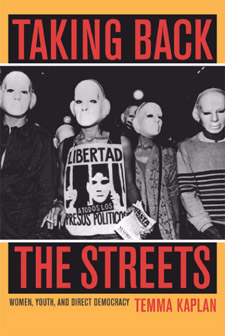 | Title: Taking back the streets: women, youth, and direct democracy Author: Kaplan, Temma 1942- Published: University of California Press, 2004 Subjects: History | Politics | Anthropology | Latin American Studies | European Studies | Women's Studies | Sociology Publisher's Description: Toward the end of the twentieth century in places ranging from Latin America and the Caribbean to Europe, the United States, South Africa, Nigeria, Iran, Japan, China, and South Asia, women and young people took to the streets to fight injustices they believed they could not confront in any other way. In the hope of changing the way politics is done, they called officials to account for atrocities they had committed and unjust laws they had upheld. They attempted to drive authoritarian governments from power by publicizing the activities these officials tried to hide. This powerful book takes us into the midst of these movements to give us a close-up look at how a new generation bore witness to human rights violations, resisted the efforts of regimes to shame and silence young idealists, and created a vibrant public life that remains a vital part of ongoing struggles for democracy and justice today. Through personal interviews, newspaper accounts, family letters, and research in the archives of human rights groups, this book portrays women and young people from Argentina, Chile, and Spain as emblematic of others around the world in their public appeals for direct democracy. An activist herself, author Temma Kaplan gives readers a deep and immediate sense of the sacrifices and accomplishments, the suffering and the power of these uncommon common people. By showing that mobilizations, sometimes accompanied by shaming rituals, were more than episodic - more than ways for societies to protect themselves against government abuses and even state terrorism - her book envisions a creative political sphere, a fifth estate in which ordinary citizens can reorient the political practices of democracy in our time. [brief] Similar Items |
| 6. |  | Title: No safe place: toxic waste, leukemia, and community action Author: Brown, Phil Published: University of California Press, 1997 Subjects: Sociology | American Studies | Ecology | Medicine | Technology and Society Publisher's Description: Toxic waste, contaminated water, cancer clusters - these phrases suggest deception and irresponsibility. But more significantly, they are watchwords for a growing struggle between communities, corporations, and government. In No Safe Place , sociologists, public policy professionals, and activists will learn how residents of Woburn, Massachusetts discovered a childhood leukemia cluster and eventually sued two corporate giants. Their story gives rise to questions important to any concerned citizen: What kind of government regulatory action can control pollution? Just how effective can the recent upsurge of popular participation in science and technology be? Phil Brown, a medical sociologist, and Edwin Mikkelsen, psychiatric consultant to the plaintiffs, look at the Woburn experience in light of similar cases, such as Love Canal, in order to show that toxic waste contamination reveals fundamental flaws in the corporate, governmental, and scientific spheres.The authors strike a humane, constructive note amidst chilling odds, advocating extensive lay involvement based on the Woburn model of civic action. Finally, they propose a safe policy for toxic wastes and governmental/corporate responsibility. Woburn, the authors predict, will become a code word for environmental struggles. [brief] Similar Items |
| 7. |  | Title: Reclaiming America: Nike, clean air, and the new national activism Author: Shaw, Randy 1956- Published: University of California Press, 1999 Subjects: American Studies | Politics | Public Policy Publisher's Description: Have activists taken the bumper-sticker adage "Think Globally, Act Locally" too literally? Randy Shaw argues that they have, with destructive consequences for America. Since the 1970s, activist participation in national struggles has steadily given way to a nearly exclusive focus on local issues. America's political and corporate elite has succeeded in controlling the national agenda, while their adversaries - the citizen activists and organizations who spent decades building federal programs to reflect the country's progressive ideals - increasingly bypass national fights. The result has been not only the dismantling of hard-won federal programs but also the sabotaging of local agendas and community instituions by decisions made in the national arena.Shaw urges activists and their organizations to implement a "new national activism" by channeling energy from closely knit local groups into broader causes. Such activism enables locally oriented activists to shape America's future and work on national fights without traveling to Washington, D.C., but instead working in their own backyards. Focusing on the David and Goliath struggle between Nike and grassroots activists critical of the company's overseas labor practices, Shaw shows how national activism can rewrite the supposedly ironclad rules of the global economy by ensuring fair wages and decent living standards for workers at home and abroad. Similarly, the recent struggles for stronger clean air standards and new federal budget priorities demonstrate the potential grassroots national activism to overcome the corporate and moneyed interests that increasingly dictate America's future. Reclaiming America's final section describes how community-based nonprofit organizations, the media, and the Internet are critical resources for building national activism. Shaw declares that community-based groups can and must combine their service work with national grassroots advocacy. He also describes how activists can use public relations to win attention in today's sprawling media environment, and he details the movement-building potential of e-mail. All these resources are essential for activists and their organizations to reclaim America's progressive ideals. [brief] Similar Items |
| 8. | 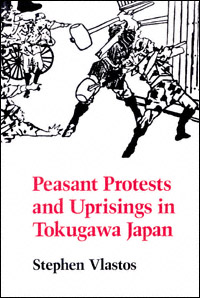 | Title: Peasant protests and uprisings in Tokugawa Japan Author: Vlastos, Stephen 1943- Published: University of California Press, 1990 Subjects: History | Japan | Asian History Publisher's Description: The Japanese peasant has been thought of as an obedient and passive subject of the feudal ruling class. Yet Tokugawa villagers frequently engaged in unlawful and disruptive protests. Moreover, the frequency and intensity of the peasants' collective action increased markedly at the end of the Tokugawa period. Stephen Vlastos's examination of the changing patterns of peasant protest in the Fukushima area shows that peasant mobilization was restricted both ideologically and organizationally and that peasants did not become a prime moving force in the Meiji Restoration. [brief] Similar Items |
| 9. |  | Title: Alliance capitalism: the social organization of Japanese business Author: Gerlach, Michael L Published: University of California Press, 1997 Subjects: Economics and Business | Sociology | Japan Publisher's Description: Business practices in Japan inspire fierce and even acrimonious debate, especially when they are compared to American practices. This book attempts to explain the remarkable economic success of Japan in the postwar period - a success it is crucial for us to understand in a time marked by controversial trade imbalances and concerns over competitive industrial performance.Gerlach focuses on what he calls the intercorporate alliance, the innovative and increasingly pervasive practice of bringing together a cluster of affiliated companies that extends across a broad range of markets. The best known of these alliances are the keiretsu , or enterprise groups, which include both diversified families of firms located around major banks and trading companies and vertical families of suppliers and distributors linked to prominent manufacturers in the automobile, electronics, and other industries. In providing a key link between isolated local firms and extended international markets, the intercorporate alliance has had profound effects on the industrial and social organization of Japanese businesses.Gerlach casts his net widely. He not only provides a rigorous analysis of intercorporate capitalism in Japan, making useful distinctions between Japanese and American practices, but he also develops a broad theoretical context for understanding Japan's business networks. Addressing economists, sociologists, and other social scientists, he argues that the intercorporate alliance is as much a result of overlapping political, economic, and social forces as are such traditional Western economic institutions as the public corporation and the stock market.Most compellingly, Alliance Capitalism raises important questions about the best method of exchange in any economy. It identifies situations where cooperation among companies is an effective way of channeling corporate activities in a world marked by complexity and rapid change, and considers in detail alternatives to hostile takeovers and other characteristic features of American capitalism. The book also points to the broader challenges facing Japan and its trading partners as they seek to coordinate their distinctive forms of economic organization. [brief] Similar Items |
| 10. |  | Title: Good with their hands: boxers, bluesmen, and other characters from the Rust Belt Author: Rotella, Carlo 1964- Published: University of California Press, 2002 Subjects: History | American Studies | Sociology | Literature | Labor Studies | Urban Studies | Ethnic Studies | Gender Studies Publisher's Description: This eloquent, streetwise book is a paean to America's Rust Belt and a compelling exploration of four milieus caught up in a great transformation of city life. With loving attention to detail and a fine sense of historical context, Carlo Rotella explores women's boxing in Erie, Pennsylvania; Buddy Guy and the blues scene in Chicago; police work and crime stories in New York City, especially as they converged in the making of the movie The French Connection; and attempts at urban renewal in the classic mill city of Brockton, Massachusetts. Navigating through accrued layers of cultural, economic, and personal history, Rotella shows how stories of city life can be found in a boxing match, a guitar solo, a chase scene in a movie, or a landscape. The stories he tells dramatize the coming of the postindustrial era in places once defined by their factories, a sweeping set of changes that has remade the form and meaning of American urbanism. A native of the Rust Belt whose own life resonates with these stories, Rotella has gone to the home turfs of his characters, hanging out in boxing gyms and blues clubs, riding along with cops and moviemakers, discussing the future of Brockton with a visionary artist and a pitbull-fancying janitor who both plan to save the city's soul. These people make culture with their hands, and hands become an expressive metaphor for Rotella as he traces the links between their individual talents and the urban scenes in which they flourish. His writing elegantly connects what happens on the street to the larger story of urban transformation, especially the shift from a way of life that demanded individuals be "good with their hands" to one that depends on the intellectual and social skills fostered by formal education and service work. Strong feelings emerge in this book about what has been lost and gained in the long, slow aging-out of the industrial city. But Rotella's journey through the streets has its ultimate reward in discovering deep-rooted instances of what he calls "truth and beauty in the Rust Belt." [brief] Similar Items |
| 11. |  | Title: Losing face: status politics in Japan Author: Pharr, Susan J Published: University of California Press, 1992 Subjects: History | Asian Studies | Asian History | Japan | Politics Publisher's Description: How does a "homogeneous" society like Japan treat the problem of social inequality? Losing Face looks beyond conventional structural categories (race, class, ethnicity) to focus on conflicts based on differences in social status. Three rich and revealing case studies explore crucial asymmetries of a . . . [more] Similar Items |
| 12. | 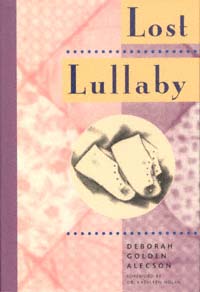 | Title: Lost lullaby Author: Alecson, Deborah Golden 1954- Published: University of California Press, 1995 Subjects: American Studies | Gender Studies | Women's Studies | Medicine | Ethics | Sociology Publisher's Description: Lost Lullaby makes one think the unthinkable: how a loving parent can pray for the death of her child. It is Deborah Alecson's story of her daughter, Andrea, who was born after a full-term, uneventful pregnancy, weighing 7 pounds 11 ounces, perfectly formed and exquisitely featured. But an inexplicable accident at birth left her with massive and irreversible brain damage. On a vitality scale of one to ten, her initial reading was one. And so begins Deborah Alecson's heart-rending struggle to come to terms with two desperately conflicting and powerful emotions: her desire to nurture and love Andrea, and her desire to do everything in her power to bring about her death.Told in a mother's voice, with a simplicity and directness that heighten the intensity of the drama that unfolds, Lost Lullaby reaffirms the human dimension of what is too often an abstract and purely theoretical discussion. During the two months that Andrea spent in the Infant Intensive Care Unit, Ms. Alecson spoke with lawyers, doctors, and ethicists in an effort to understand the legal, medical and ethical implications of her plight. She recounts those discussions and describes legal cases that have a direct bearing on her own situation. Her battle - both in coming to the agonizing decision to let her child die and in convincing the medical and legal establishments to respect that decision - will engender empathy for the plight of many families, and an awareness of the need to use medical technology with restraint. It is a must-read for everyone who cares about how we make life-and-death decisions on these new medical, legal, and moral frontiers. [brief] Similar Items |
| 13. |  | Title: Lawyers, lawsuits, and legal rights: the battle over litigation in American society Author: Burke, Thomas Frederick Published: University of California Press, 2002 Subjects: Politics | Law Publisher's Description: Lawsuits over coffee burns, playground injuries, even bad teaching: litigation "horror stories" create the impression that Americans are greedy, quarrelsome, and sue-happy. The truth, as this book makes clear, is quite different. What Thomas Burke describes in Lawyers, Lawsuits, and Legal Rights is a nation not of litigious citizens, but of litigious policies - laws that promote the use of litigation in resolving disputes and implementing public policies. This book is a cogent account of how such policies have come to shape public life and everyday practices in the United States. As litigious policies have proliferated, so have struggles to limit litigation - and these struggles offer insight into the nation's court-centered public policy style. Burke focuses on three cases: the effort to block the Americans with Disabilities Act; an attempt to reduce accident litigation by creating a no-fault auto insurance system in California; and the enactment of the Vaccine Injury Compensation Act. These cases suggest that litigious policies are deeply rooted in the American constitutional tradition. Burke shows how the diffuse, divided structure of American government, together with the anti-statist ethos of American political culture, creates incentives for political actors to use the courts to address their concerns. The first clear and comprehensive account of the national politics of litigation, his work provides a new way to understand and address the "litigiousness" of American society. [brief] Similar Items |
| 14. | 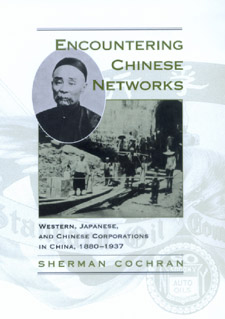 | Title: Encountering Chinese networks: Western, Japanese, and Chinese corporations in China, 1880-1937 Author: Cochran, Sherman 1940- Published: University of California Press, 2000 Subjects: History | Economics and Business | Asian History | China Publisher's Description: Big businesses have faced a persistent dilemma in China since the nineteenth century: how to retain control over corporate hierarchies while adapting to local social networks. Sherman Cochran, in the first study to compare Western, Japanese, and Chinese businesses in Chinese history, shows how various businesses have struggled with this issue as they have adjusted to dramatic changes in Chinese society, politics, and foreign affairs. Cochran devotes a chapter each to six of the biggest business ventures in China before the Communist revolution: two Western-owned companies, Standard Oil and British-American Tobacco Company; two Japanese-owned companies, Mitsui Trading Company and Naigai Cotton Company; and two Chinese-owned firms, Shenxin Cotton Mills and China Match Company. In each case, he notes the businesses' efforts to introduce corporate hierarchies for managing the distribution of goods and the organization of factory workers, and he describes their encounters with a variety of Chinese social networks: tenacious factions of English-speaking compradors and powerful trade associations of non-English-speaking merchants channeling goods into the marketplace; and small cliques of independent labor bosses and big gangs of underworld figures controlling workers in the factories. Drawing upon archival sources and individual interviews, Cochran describes the wide range of approaches that these businesses adopted to deal with Chinese social networks. Each business negotiated its own distinctive relationship with local networks, and as each business learned about marketing goods and managing factory workers in China, it adjusted this relationship. Sometimes it strengthened its hierarchical control over networks and sometimes it delegated authority to networks, but it could not afford to take networks for granted or regard them as static because they, in turn, took their own initiative and made their own adjustments. In this book Cochran calls into question the idea that the spread of capitalism has caused business organizations to converge over time. His cases bring to light numerous organizational forms used by Western, Japanese, and Chinese corporations in China's past, and his conclusions suggest that businesses have experimented with new forms on the basis of their historical experiences - especially their encounters with social networks. [brief] Similar Items |
| 15. | 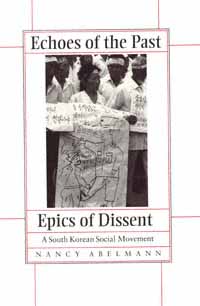 | Title: Echoes of the past, epics of dissent: a South Korean social movement Author: Abelmann, Nancy Published: University of California Press, 1996 Subjects: Anthropology | Asian Studies | Politics | Sociology | Cultural Anthropology Publisher's Description: Echoes of the Past, Epics of Dissent , the story of a South Korean social movement, offers a window to a decade of tumultuous social protest in a postcolonial, divided nation. Abelmann brings a dramatic chapter of modern Korean history to life - a period in which farmers, student activists, and organizers joined to protest the corporate ownership of tenant plots never distributed in the 1949 Land Reform.From public sites of protest to backstage meetings and negotiations, from farming villages to university campuses, Abelmann's highly original study explores this movement as a complex process always in the making. Her discussion moves fluently between past and present, local and national, elites and dominated, and urban and rural. Touching on major historical issues, this ethnography of dissent explores contemporary popular nationalism and historical consciousness. [brief] Similar Items |
| 16. | 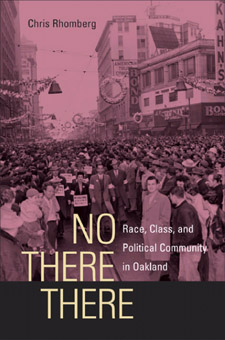 | Title: No there there: race, class, and political community in Oakland Author: Rhomberg, Chris 1959- Published: University of California Press, 2004 Subjects: Sociology | Anthropology | American Studies | Labor Studies | Politics | Ethnic Studies | Urban Studies Publisher's Description: Challenged by Ku Klux Klan action in the '20s, labor protests culminating in a general strike in the '40s, and the rise of the civil rights and black power struggles of the '60s, Oakland, California, seems to encapsulate in one city the broad and varied sweep of urban social movements in twentieth-century America. Taking Oakland as a case study of urban politics and society in the United States, Chris Rhomberg examines the city's successive episodes of popular insurgency for what they can tell us about critical discontinuities in the American experience of urban political community. [brief] Similar Items |
| 17. |  | Title: Urban design downtown: poetics and politics of form Author: Loukaitou-Sideris, Anastasia 1958- Published: University of California Press, 1998 Subjects: Urban Studies | Economics and Business | Social Science | Architecture | Sociology Publisher's Description: The corporate downtown, with its multitude of social dilemmas and contradictions, is the focus of this well-illustrated volume. How are downtown projects conceived, scripted, produced, packaged, and used, and how has all this changed during the twentieth century? The authors of Urban Design Downtown offer a critical appraisal of the emerging appearance of downtown urban form. They explore both the poetics of design and the politics and economics of development decisions.Following a historical review of the various phases of downtown transformation, Anastasia Loukaitou-Sideris and Tridib Banerjee turn to contemporary American downtowns. They examine the phenomenon of public-space privatization, arguing that corporate open spaces are the consumer-oriented result of policies that have promoted downtown renovation and restructuring but at the same time have neglected the cities' existing poverty-stricken cores. The book's case studies of individual West Coast downtown projects capture the essence of late twentieth-century urbanism. This analysis of downtown urban America, which offers extensive insight into the design and development process, will interest architects, city planners, developers, and urban designers everywhere. [brief] Similar Items |
| 18. | 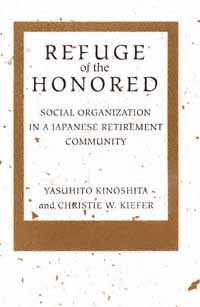 | Title: Refuge of the honored: social organization in a Japanese retirement community Author: Kinoshita, Yasuhito 1953- Published: University of California Press, 1993 Subjects: Anthropology | Cultural Anthropology | Sociology | Japan Publisher's Description: Faced with the decline of the traditional family and the explosive growth of the over-65 population, the Japanese are looking for new ways to care for their elders. This timely study documents the birth of a major social phenomenon in Japan - the planned retirement community.In the mid-1980s, Yasuhito Kinoshita spent a year living in Japan's first such community, Fuji-no-Sato. His collaboration with Christie W. Kiefer, a cultural gerontologist, is the first detailed study of a retirement community in a non-Western culture.Fuji-no-Sato is a social community with no visible traditions. Kinoshita and Kiefer show that its residents' preference for long-established relationships creates the need for the invention of relationships that have no precedent in Japanese society.This book reveals much about Japanese culture, and about the "graying of society" that plagues the newly industrialized countries of Asia. Its lessons about sensitivity to the elderly's values and the need for clear communication have important applications in other cultures as well. [brief] Similar Items |
| 19. | 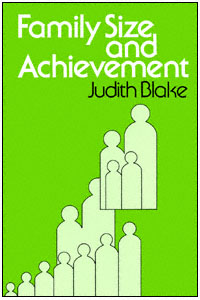 | Title: Family size and achievement Author: Blake, Judith Published: University of California Press, 1992 Subjects: Sociology | Demography Publisher's Description: The children born since the end of the postwar baby boom are the first in American history to come primarily from small families - families of three or fewer children. Judith Blake calls this momentous change the sibsize revolution, and this book focuses on the cognitive and educational consequences . . . [more] Similar Items |
| 20. | 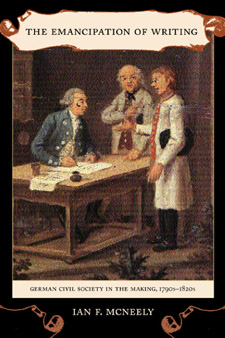 | Title: The emancipation of writing: German civil society in the making, 1790s-1820s Author: McNeely, Ian F 1971- Published: University of California Press, 2003 Subjects: History | European Studies | German Studies | European History | Sociology | Political Theory | Anthropology Publisher's Description: The Emancipation of Writing is the first study of writing in its connection to bureaucracy, citizenship, and the state in Germany. Stitching together micro- and macro-level analysis, it reconstructs the vibrant, textually saturated civic culture of the German southwest in the aftermath of the French Revolution and Napoleon's invasions. Ian F. McNeely reveals that Germany's notoriously oppressive bureaucracy, when viewed through the writing practices that were its lifeblood, could also function as a site of citizenship. Citizens, acting under the mediation of powerful local scribes, practiced their freedoms in written engagements with the state. Their communications laid the basis for civil society, showing how social networks commonly associated with the free market, the free press, and the voluntary association could also take root in powerful state institutions. [brief] Similar Items |